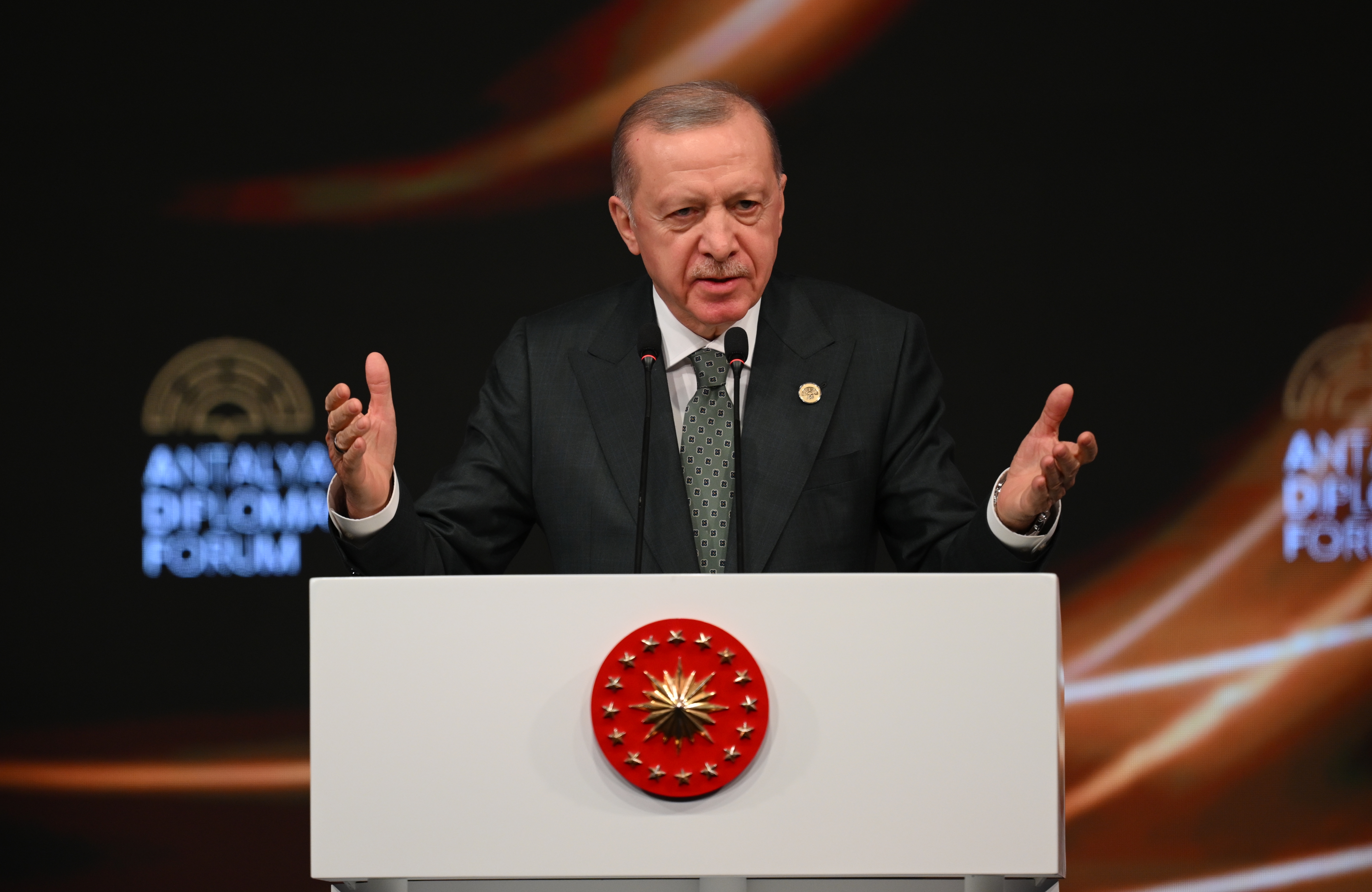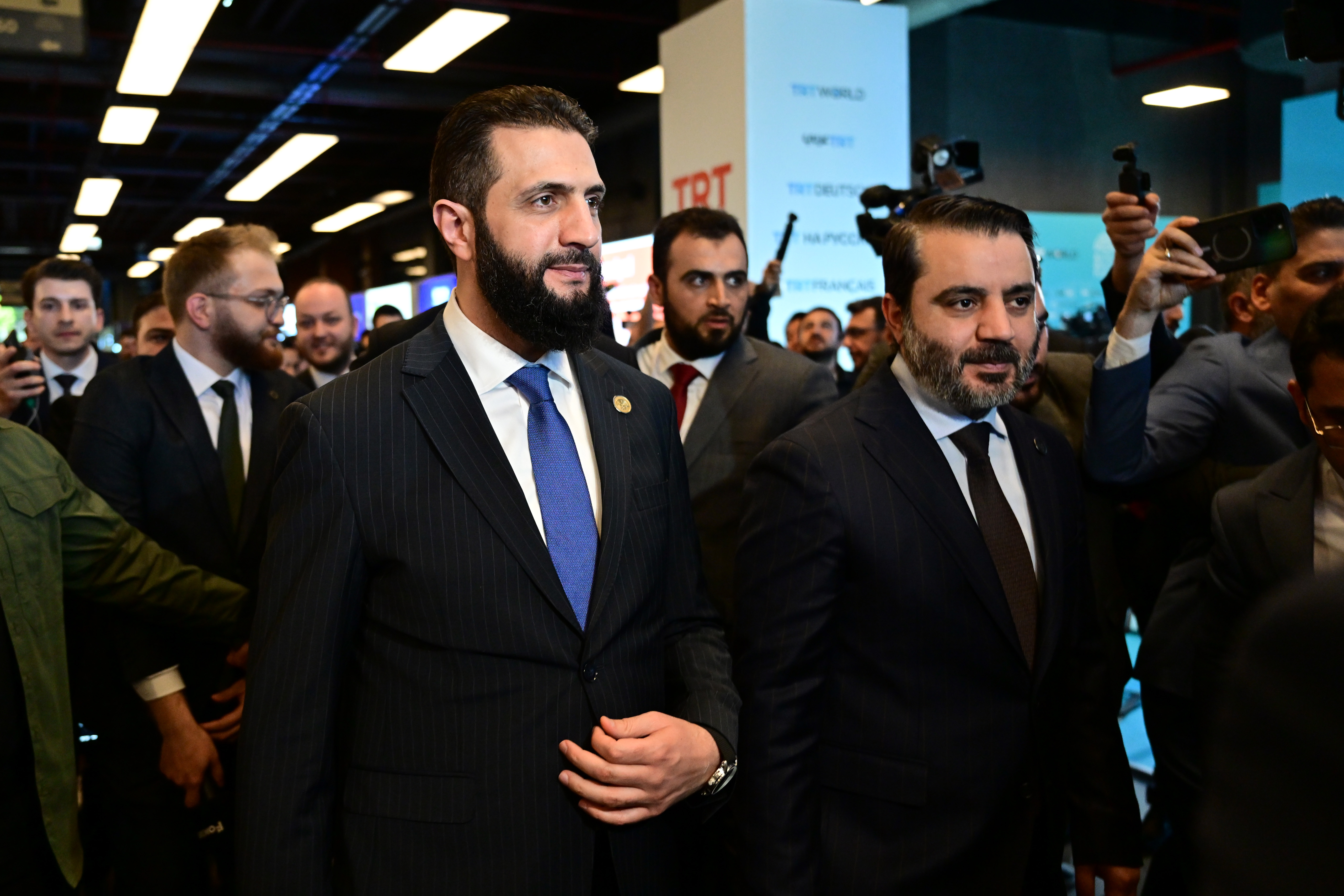A high-level panel on new Syria’s reconstruction on the second day of the 4th Antalya Diplomacy Forum 2025 sparked a candid conversation about the country’s path forward under the new administration, highlighting the optimism of its citizens, but also warning of critical challenges posed by sanctions, foreign interventions, and the lack of international support.
Moderated by Wadah Khanfar, president of Al Sharq Forum and former director general of Al Jazeera, the session titled “Syria: A Reconciled and Rebuilt Country” on Saturday (April 12) featured a high-level panel, including Nuh Yilmaz, Deputy Minister of Foreign Affairs of Türkiye; Geir O Pedersen, UN Special Envoy for Syria; Jeffrey Sachs, President, UN Sustainable Development Solutions Network and Carl Skau, Deputy Executive Director and Chief Operating Officer, United Nations World Food Programme (WFP).
Opening the session, Khanfar underlined Syria's enduring geopolitical significance.
“Strategically, it is a centre of geopolitics. It is part of every conflict the region has ever seen and part of every solution as well,” he said, emphasising that a stable Syria could reignite hope for the broader Middle East.
Reflecting on a recent visit to Damascus, Khanfar spoke of a new sense of optimism. “I have seen the new hope that emerged amongst the people of Syria,” he remarked.
Earlier on Friday, Turkish President Recep Tayyip Erdogan held a high-level meeting with Syrian President Ahmed al Sharaa on the sidelines of the Forum, highlighting the growing bilateral ties and Damascus’s key role in regional stability. President Erdogan told his Syrian counterpart that Ankara will continue its diplomatic efforts to lift international sanctions on Syria.
Syria’s new Foreign Minister Asaad al Shaibani attended the opening day and was scheduled to participate in Saturday’s session, but had to depart late Friday night due to urgent developments, Turkish Deputy Foreign Minister Yilmaz informed the audience.
Yet, the Syrian people remained the central focus of the conversation.
Yilmaz shared new polling data from The Economist, noting a marked shift in Syrian public sentiment. “Seventy percent of Syrians across the country and across sects are optimistic about the future. Eighty percent feel freer than they did under the Assad regime. Eighty percent have a favourable view of President Sharaa,” Yilmaz said.
“So after 14 years, they really think they can achieve something.”

Security dynamics and Israeli airstrikes: A persistent threat
Yilmaz addressed recent reports of Turkish-Israeli “deconfliction talks” in Azerbaijan regarding Syrian airspace, clarifying that these were strictly technical, not diplomatic.
“It’s about the deconfliction mechanism... When you use an airspace, you have to communicate with other actors that are actively using it,” he explained.
However, Khanfar challenged the political implications of continued Israeli strikes in Syria. “By continuing, that means they are delegitimising the current reality and basically putting Syria under heavy pressure,” he argued.
Yilmaz acknowledged the issue, calling Israeli operations “one of the biggest dangers that undermines the political legitimacy” of the new Syrian government. “Israel’s expansion is the biggest threat right now,” he warned, suggesting that chaos on the ground could be exploited to justify Israel’s continued presence in Syria.
Inclusive governance and international response
Pedersen, the UN Special Envoy for Syria, urged both patience and accountability as Syria attempts a fragile transition under President Sharaa.
“No one saw this coming... but immediately, the international community gathered in [the Jordanian city of] Aqaba,” Pedersen recalled, referring to a post-transition conference that saw participation from Western and Arab countries but excluded Russia, China, and Iran.
Pedersen stressed the importance of inclusive governance. “If Sharaa delivers on his promises—an inclusive governance structure, maintaining state institutions—the international community will deliver,” he said, citing improvements such as a new constitutional declaration and an inclusive government structure.

Sanctions dilemma: Crushing hope and economic recovery
All speakers agreed that international sanctions remain a critical barrier to rebuilding Syria. “Sanctions are killing people,” Khanfar said bluntly, recounting how ordinary Syrians, once surviving through informal trade, are now unable to access basic supplies.
Pedersen echoed this concern: “Without sanctions ending, we are heading towards a disaster. The economic and humanitarian situation is getting even worse,” he warned. “Washington is sitting on the fence… They haven’t decided.”
While pointing out that humanitarian aid is supposed to be exempt from sanctions, Pedersen urged Türkiye, the EU, and Arab states to pressure the US to allow at least essential services like health, education, and banking to function.
“We can’t afford this to fail. We need Syria to succeed.”
Sachs: Peace will come only through real diplomacy
Sachs delivered a scathing critique of US and Israeli policies in the Middle East, asserting that both those countries continue to exploit the war in Syria. “We will not have peace in this region until we have public diplomacy that is based on real diplomacy, not on CIA operations," he said.
Sachs argued that the US and Israel have pursued a long-term strategy of reshaping the Middle East through military interventions and regime-change wars. "The Syrian war is just one of six wars that Israel has promoted, including in Lebanon, Iraq, Syria, Libya, Somalia and Sudan," he stressed.
He emphasised that these were “wars of choice”, not necessity, and condemned the role of imperial powers in dictating the region's fate.
“This region has been divided for 100 years, first by the British Empire and then by the American Empire," said Sachs, adding that "Israel could never do these wars on its own. These are American wars... Israel couldn’t fight for one day without the US backing."
Sachs offered a simple solution to stop the wars in the Middle East. "All that is required, in my view, is the United States change its veto of Palestine as the 194th UN member state... and the wars all across this region would stop," he contended.
"Until that stops, we're not going to have peace.”



















